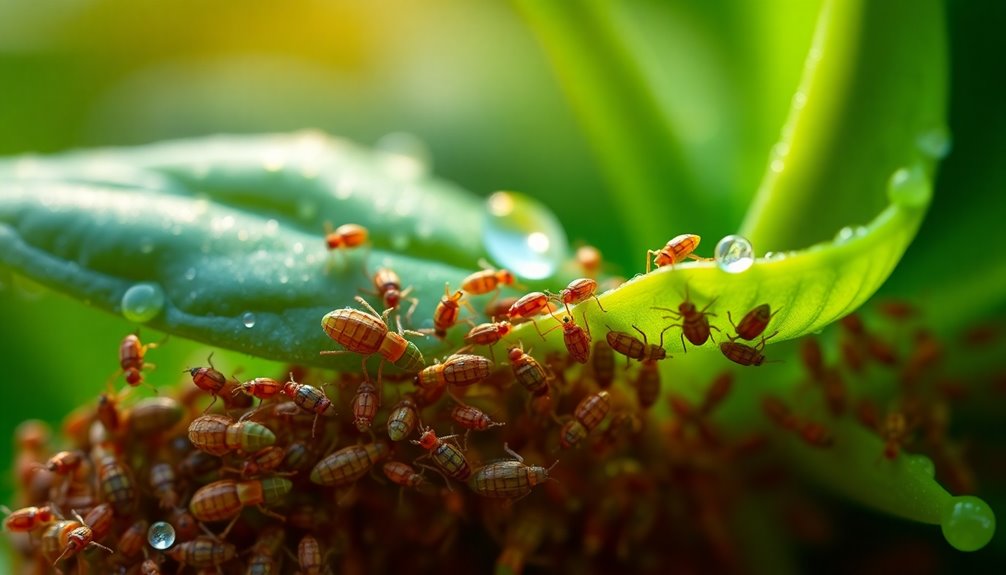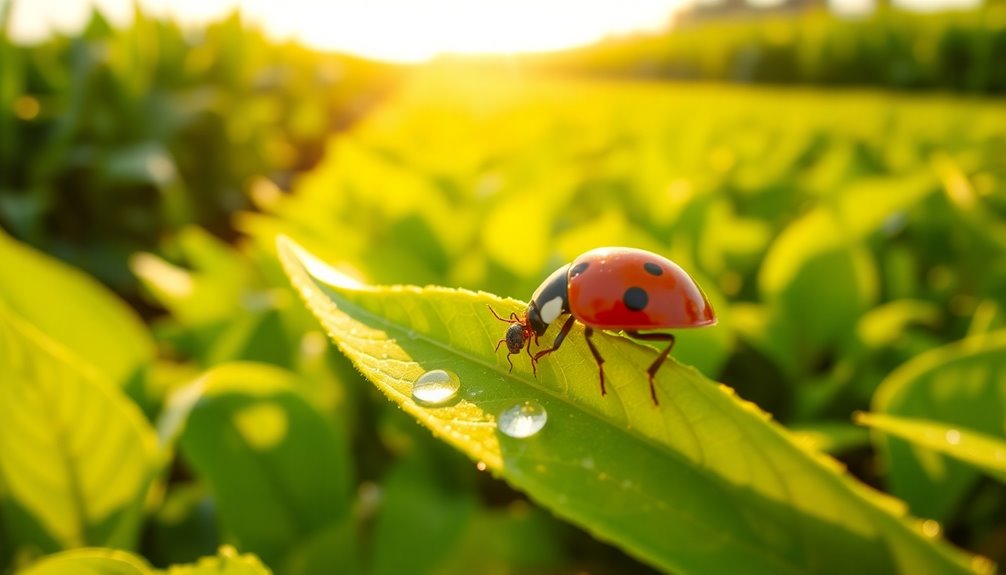Innovative breakthroughs like genetically modified citrus trees and RNA-based agents are changing the game in the plant-pest battle. These approaches enhance plant immunity, reduce reliance on chemicals, and promote sustainability. High-throughput screening methods have identified new antimicrobial peptides that fight diseases like citrus greening effectively. Together, these advancements signal a promising future for eco-friendly farming practices. You'll find even more exciting developments on the horizon that could transform how we approach agriculture.
Key Takeaways
- Genetically modified citrus trees using Bt proteins show promise in combating citrus greening disease, reducing reliance on traditional insecticides.
- RNA-based agents enhance plant immunity, achieving up to 100% survival against Cucumber mosaic virus, paving the way for sustainable disease management.
- High-throughput screening methods have identified six new antimicrobial peptides that could effectively fight pathogens responsible for citrus greening.
- Sustainable agricultural practices focus on eco-friendly genetic modifications and biological controls to minimize chemical use and improve crop resilience.
- Advances in AI and machine learning are revolutionizing plant disease detection, optimizing pesticide applications, and supporting early interventions for better crop yields.

As researchers tackle the ongoing challenges posed by plant pests and diseases, recent breakthroughs in biotechnology are revolutionizing how we protect crops. One significant advancement comes in the form of genetically modified citrus trees designed to combat citrus greening disease, or Huanglongbing (HLB). This disease, transmitted by the tiny Asian citrus psyllid, has wreaked havoc on the global citrus industry. By incorporating a gene from Bacillus thuringiensis (Bt), these trees produce a protein that specifically targets the psyllid's gut, effectively disrupting its cell function and leading to its demise. The urgency for new methods has increased as traditional practices have failed to control the disease effectively.
Additionally, researchers at Martin Luther University Halle-Wittenberg have introduced RNA-based agents that bolster plant immunity against the Cucumber mosaic virus (CMV), one of agriculture's most prevalent viral threats. These innovative agents enhance the plant's defenses, showing remarkable efficacy in laboratory tests, where treated plants demonstrated an 80 to 100% survival rate even under high viral loads. The adaptability of this technology also means it can quickly target emerging viral mutations, ensuring ongoing protection.
Researchers have developed RNA-based agents that enhance plant immunity, achieving up to 100% survival against the Cucumber mosaic virus.
Texas A&M AgriLife researchers have taken a different approach by using plant hairy roots for high-throughput screening of antimicrobial treatments against fastidious pathogens like those responsible for citrus greening. This method has yielded six new antimicrobial peptides that show promise in combating similar diseases, with plans for scaling up to industrial applications.
These breakthroughs reflect a commitment to sustainable practices, aiming to reduce chemical use while enhancing crop resilience. Genetic modifications and biological controls like Bt proteins and RNA agents serve as eco-friendly alternatives to traditional insecticides, fostering long-term sustainability without the need for constant interventions.
Moreover, advances in biotechnology, including AI and machine learning, are set to transform how you detect and manage plant diseases. By optimizing pesticide applications and facilitating early interventions, these tools can significantly reduce crop losses, ensuring a more productive and sustainable agricultural future.
Collaboration among researchers, universities, and private sectors remains key to these innovations, propelling green farming solutions forward.
Frequently Asked Questions
What Are the Main Types of Pests Affecting Crops Today?
You'll encounter several main types of pests affecting crops today.
Insect pests like the cotton bollworm and tobacco whitefly can devastate your crops. Fungal, bacterial, and viral diseases also pose significant threats to plant health.
Non-insect pests, including weeds, rodents, and nematodes, compete for resources and damage plants directly.
Understanding these pests will help you implement effective management strategies to protect your crops and ensure a successful harvest.
How Do Traditional Pest Control Methods Compare to New Breakthroughs?
Did you know that traditional pest control methods can reduce pest populations by up to 80% using natural resources?
When you compare these methods to new breakthroughs, you'll find traditional strategies often have a lower environmental impact and are more sustainable.
However, new methods, especially those using genetic engineering, can offer targeted solutions and greater consistency.
Ultimately, the choice depends on your priorities regarding cost, effectiveness, and ecological balance.
Are There Any Risks Associated With These New Farming Techniques?
Yes, there are several risks associated with new farming techniques. You might face high initial costs and market fluctuations, making it tough to justify the investment.
Additionally, over-reliance on technology can lead to issues like pest resistance and disrupted ecosystems.
You also need to consider potential data inaccuracies and the challenges of integrating new systems with existing operations.
Lastly, limited access to these technologies can leave small-scale farmers at a disadvantage.
How Can Farmers Implement These Findings Effectively on Their Farms?
To implement these findings effectively on your farm, start by integrating biostimulants and gene silencing techniques tailored for specific pests.
Use advanced spraying systems for precise pesticide application and reduced chemical use.
Incorporate crop rotation and beneficial organisms to enhance pest management naturally.
Utilize real-time monitoring technologies to detect pest outbreaks early.
Lastly, embrace data-driven decisions to optimize your strategies and maintain ecological balance while boosting crop yields.
What Role Do Consumers Play in Supporting Green Farming Practices?
You've got the power to be a champion for green farming! By choosing sustainable products, you're not just buying groceries; you're investing in the planet's future.
Supporting local farms helps reduce carbon footprints, while avoiding plastic packaging shows your commitment to eco-friendly practices.
Your voice matters, too—advocating for stricter regulations pushes businesses to adopt greener methods.
Together, you and other consumers can create a ripple effect that nurtures sustainable agriculture for generations to come.
Conclusion
In this thrilling plant-pest battle, you've discovered groundbreaking solutions that could revolutionize green farming. By embracing these innovations, you're not just fighting pests; you're paving the way for a sustainable future that's brighter than a thousand suns. Your commitment to eco-friendly practices can inspire others, creating a ripple effect that transforms agriculture. So, let's arm ourselves with this knowledge and cultivate a thriving, harmonious relationship with nature that will stand the test of time.









